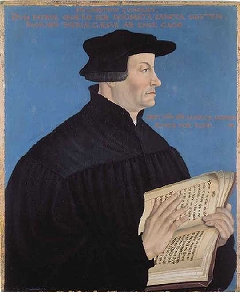
From: The Oxford Companion to Christian Thought. Edited by Adrian Hastings, Alistair Mason and Hugh Pyper with Ingrid Lawrie and Cecily Bennett, Oxford (Oxford University Press) 2000, p. 765/6.
© Oxford University Press 2000
The Protestant Reformer, Zwingli, was born in the Toggenburg valley, Lower Alps, now in the Swiss canton of St Gallen. His family belonged to the upper ranks of the peasantry, and Toggenburg had numerous links with the Swiss confederacy. This background explains why Zwingli, throughout his life, felt he had a right and duty to engage in politics, and why he saw Switzerland as his fatherland. Maintaining his country's independence and restoring it to true godliness were supreme goals of his life.
Zwingli studied at Bern, Vienna, and Basel; after a brief period of theological study he was ordained priest and worked from 1506 at Glarus, from 1516 at Maria Einsiedeln. He was influenced by scholasticism, especially that of Duns Scotus, and subsequently by humanism, later above all by Erasmus, whom he knew personally.
On 1 January 1519 he was appointed people's priest at the Great Minster in Zürich. His battle against the supplying of Swiss mercenaries, especially the contract with France, involved him in Zürich's politics. All his life he fought against this 'commerce', which, while highly profitable to the upper classes, sent many young men, perhaps to a life of adventure, but often to death or permanent injury.
He was fully aware of the Reformation starting in 1517 in Luther's circle, but Luther's theology had limited influence on him. Various reformist innovations (such as breach of the fasting laws) were introduced in Zürich in 1522, and in 1523 the Reformation arrived in the shape of two great Disputations - the first example ever of a successful 'city reformation'. Zwingli had been a decisive influence throughout.
It soon became clear that the people later called Anabaptists, while in basic agreement with Zwingli, were prepared to surrender the bond between civic society and the Christian community, a choice that Zwingli would not endorse. While a catholic front was gaining strength in the Swiss Confederation, there was now another opposition in Zürich itself. Doctrinal differences with Luther, particularly over the Eucharist, became increasingly obvious through their writings. The Colloquy of Marburg (1529) failed to resolve these differences, which severely hampered the formation of a Protestant alliance. Zwingli's entanglement in confessional alliance politics and in the drift towards war in Switzerland resulted in his death at the Battle of Kappel, 11 October 1531.
For the final establishment of the Reformation, Zürich must thank Zwingli's successor, Heinrich Bullinger (1504—75). The Consensus Tigurinus between him and Calvin (1549) led to Reformed Protestantism's bearing the stamp of Calvinism rather than 'Zwinglianism', despite Bullinger's international reputation.
The starting-point for Zwingli's theology and personal piety is God's sovereignty. Nothing can hinder God's foreknowledge and election. His activity embraces even negative factors in history and extends beyond the church. The working of his Holy Spirit can be recognized in the pagan philosophers and heroes; it is not confined within sacramental actions. This is not in any way to question the unique salvific work of Jesus Christ accomplished in his Incarnation, vicarious death, Resurrection, and bodily presence in heaven. The dogma of the Trinity, Father, Son, and Spirit, and the two natures, unconfused and undivided, of the Redeemer are accepted as in the early centuries. Zwingli believed that at that time the principle of scriptual authority, sola scriptura, was still in control.
This concept of God excludes any divinization of creatures such as the Roman Catholic veneration of the saints, sacramentalism, and hierarchy. For Zwingli, Luther's clinging to the real presence of Christ's body and blood in the supper is 'papistical'. The working of the Spirit in Christians is independent of any rite; It is God's free act, owing nothing to human merit.
Equally fundamental with God's sovereignty is God's covenant with humanity. The people of God in the OT and NT is one single covenant people; infant baptism corresponds to circumcision. Hence the Anabaptists are wrong to attach conditions to it. Their separating themselves from the people as a whole is also to be rejected. The word of God, as recovered in the Reformation, is urgently necessary for the well-being of the res publica, in Zürich and throughout Switzerland.
Nevertheless, Zwingli is not for theocracy in the proper sense nor for holy war. Divine and human justice must be clearly distinguished. That which is, without qualification, good in God's sight - in the sense of the Sermon on the Mount - and our justification by grace alone are sharply differentiated from political action. Compensatory adjustments to society (care for the poor, including distribution of monastic wealth) and education at school and university level arc indispensable for a healthy community life, as is control of morals, but not, as in Calvin's model, as part of church discipline. Zwingli was not a puritan.
Some features of Zwingli's teaching that did not pass over into Calvinist orthodoxy are: stress on election rather than rejection in the doctrine of predestination; restriction of the effect of original sin to the corruption of nature, with guilt attaching only to actual sins; the possible salvation of pious pagans.
His death in battle immediately prompted hostile polemic from his opponents, and glorification and talk of martyrdom by his supporters. Both arc unjustified. His death was more in the nature of an accident. He saw himself as a prophet, meaning one who interprets God's word. This makes him neither 'political' nor 'apolitical' in the modern sense. From the Enlightenment onwards, his type of 'rational' Reformation gained in appeal. Particularly as regards eucharistic theology, a large proportion of modern Protestants are in fact Zwinglians.
For a short biography in German, see Biographie Huldrych Zwinglis
09-01-2008